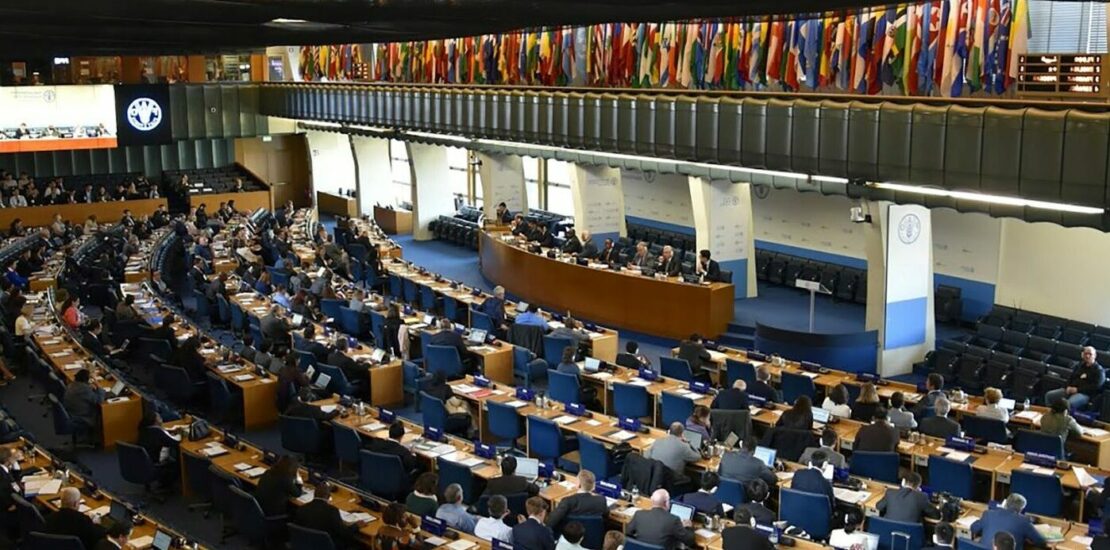News digest: policy
- 18/01/2021
- Posted by: Gaetan Dermien
- Category: Africa, Caribbean, News, Pacific

GLOBAL
Global Forum for Food and Agriculture goes digital
The 13th Global Forum for Food and Agriculture will be the first to be totally digital. The GFFA, 18–22 January, has the theme “How to feed the world in times of pandemics and climate change?”. The annual Berlin-based meeting, hosted by the German Federal Ministry of Food and Agriculture (BMEL), is held under the umbrella of International Green Week. Around 2,000 international participants from politics, industry, science and civil society will meet to discuss agri-food policy issues. Proceedings can be viewed via live stream with no registration necessary.
Agro-ecology at the center of the One Planet Summit commitments for Africa
Acknowledging that agroecology helps preserve biodiversity while addressing the Sustainable Development Goals and creating jobs, this One Planet Summit decided to make it a key aspect of international efforts (France Policy, 12 January). This issue is particularly important in Africa, where the effects of climate change, land degradation and biodiversity loss are combining and threaten many countries’ food security. So the multi-stakeholder Great Green Wall Accelerator initiative has been established to catalyse financial efforts by all donors, giving new impetus to this ambitious African initiative, launched in the 1980s, to green the Sahel. The initiative’s partners have pledged almost €14 billion ($16.85 billion) in international finance for the 11 countries concerned by 2025. Some $14.3 billion has already been budgeted. The President of the European Commission announced that it could contribute more than €2.5 billion in its upcoming programming. More than 100 private companies, grouped around the International Agroecological Movement for Africa (IAM AFRICA) charter, have also committed to contribute to the implementation of agroecological transition objectives in the Great Green Wall countries. A secretariat, attached to the United Nations Convention to Combat Desertification (UNCCD), has been created to follow up on these commitments.
ACP-EUROPE
The post-Cotonou agreement
A Discussion Paper from ECDPM (December 2020) titled “ACP-EU relations: The end of preferences?” offers the author’s personal assessment of the post-Cotonou agreement. The new agreement is regionalised, with separate protocols for Africa, the Caribbean and the Pacific. Environment and climate change will receive priority attention in future cooperation, alongside investment for growth and jobs. The ACP–EU partnership has gradually evolved from a preferential relationship towards a reciprocal, interest-driven partnership. Set against a gloomy global environment, its renewal for 20 years embodies the partners’ geopolitical solidarity and their commitment to multilateralism.
EU-Africa move in step on Geographical Indications revolution
The African Union has requested the support of the UN Food and Agriculture Organization (FAO) to establish a continental strategy for Geographical Indications (GIs), a call that was picked up by other global institutions including the European Commission, the French Development Agency (AFD) and the World Intellectual Property Organization (WIPO) (Euractiv, 17 December). The protection of GIs could help preserve and promote Africa’s rich agricultural tradition, creating a legal framework on intellectual property and at the same time contributing to rural development in African countries.
COMESA and EU sign institutional capacity building pact
The Common Market for Eastern and Southern Africa (COMESA) and the European Union (EU) have signed a €7.6 million financing agreement for institutional capacity building in Africa. Chronicle (13 January). The COMESA institutional capacity building programme is financed through the 11th European Development Fund (EDF), and is in line with EU and COMESA policies to enhance the capacity of both the COMESA Secretariat and Member States, including the private sector, to deepen regional integration. The programme will be implemented over five-years.
EPA between SACU Member States & Mozambique, and UK & Northern Ireland
The Economic Partnership Agreement between the Southern African Customs Union (SACU) Member States (Botswana, Eswatini, Lesotho, Namibia and South Africa) and Mozambique on the one part, and the United Kingdom of Great Britain and Northern Ireland on the other part (SACUM-UK EPA), entered into force on 1 January 2021 (Mail & Guardian, 7 January). The SACUM-UK EPA establishes a free trade area between the parties, and replicates the preferential tariff treatment of the EU-SADC EPA, with the exception of the volume limitations on Tariff Rate Quotas.
EIB support for investment in Sahel under Great Green Wall initiative
The European Investment Bank has announced that it aims to provide new financial and technical support to back sustainable agriculture, clean energy, water, infrastructure and private sector financing in 11 Sahel countries most vulnerable to a changing climate by 2025 (EIB Newsroom, 11 January). The support will enhance the impact of the Great Green Wall initiative to improve biodiversity in the Sahel and better tackle climate and environmental challenges facing the region. The 11 countries selected are Burkina Faso, Chad, Djibouti, Eritrea, Ethiopia, Mali, Mauritania, Niger, Nigeria, Senegal and Sudan.
AFRICA
AfCFTA can position African economies better against Covid-19
The African Continental Free Trade Area (AfCFTA) Agreement can potentially position African economies stronger in the face of future global shocks such as the ongoing Covid-19 pandemic, a senior United Nations trade policy expert said on Wednesday. David Luke, Coordinator of the Africa Trade Policy Center at the UN Economic Commission for Africa (UNECA), says “A key implication of these challenges for Africa is that the continent needs to produce more of what it consumes. Successful implementation of the AfCFTA could support the development of competitive and resilient regional value chains and increase domestic and regional industrialisation” (XinhuaNet, 7 January).
OPEC financing to boost international trade with Africa
The OPEC Fund for International Development has approved $50 million financing to support international trade with West Africa (Togo First, 18 December). Besides West Africa, other countries that will benefit from the funds are The Gambia ($20 million), Madagascar ($15 million), Rwanda ($20 million), Sierra Leone ($15 million), Egypt ($30 million), and Uzbekistan ($75 million).
IFDC and EBID collaborate to improve soil health in West Africa
The International Fertiliser Development Centre (IFDC) has signed a Memorandum of Understanding with the ECOWAS Bank for Investment and Development (EBID) to collaborate in improving soil health and plant nutrition in West Africa (Nigerian Tribune, 16 December). Under the agreement, IFDC will partner with EBID to support soil fertility mapping in ECOWAS countries and the rollout of the ECOWAS Agricultural and Investment Programme, and pool resources to assist ECOWAS countries to import fertilisers and inputs guided by the soil mapping programmes.
Ghana ports and the future of African Continental Free Trade
Modern Ghana (6 January) reports on the present situation, future potential and policy directions for Ghana’s ports in light of the Covid-19 pandemic and the coming into force of the African Continental Free Trade Area (AfCFTA). Over 100 shipping lines and charters operating within the corridors of the country help to facilitate and secure international trade of transport of containerised goods and vehicles, contributing significantly to export and import growth, boosting port infrastructure and creating employment.
AfCFTA should prioritise MSMEs, women and youth
South African President Cyril Ramaphosa, in his capacity as outgoing Chairperson of the African Union, says the African Continental Free Trade Area (AfCFTA) must focus on the development of small and medium enterprises and prioritise the inclusion of women and youth (SABC News, 2 January). African countries have begun to officially trade under the new agreement.
A Brookings report (6 January) discusses a report by the Nigerian Association of Chambers of Commerce, Industry, Mines, and Agriculture (NACCIMA) that surveyed 1,804 MSMEs across Nigeria in four core sectors – agriculture, manufacturing, services and wholesale/retail – to better understand the costs and benefits of the African Continental Free Trade Agreement (AfCFTA) to these firms. More than 50% were concerned about the threat posed by imported cheaper goods competing with local products due to the AfCFTA.
Recent developments for investors across East Africa
Lexology provides a December 2020 on some of the key recent developments investors should be aware of across various sectors in East Africa, including information on progress at the hydropower station in Tanzania, investment opportunities in Rwanda and Kenya, expansion in the banking sector in Ethiopia, the Uganda Investment Authority’s new strategic plan, and more.
South Africa–Zimbabwe border: One-stop post could address chaos
Long delays recently resurfaced at Beitbridge Border Post, with travellers spending close to 3 days to access either South Africa or Zimbabwe (Nehanda Radio, 8 January). The Zimbabwean Government is upgrading Beitbridge Border Post at a cost of US$300 million and it is believed that on completion the port will carry five times its capacity. Zimbabwe and South Africa have, for some time, been working on establishing a One Stop Border Post (OSBP) concept at Beitbridge to improve services and the flow of traffic. Under the OSPB the two countries would harmonise operations to simplify the way of business and travellers are cleared once for passage into either country.
CARIBBEAN
CARICOM Single Market and Economy will be principal means of recovery
In a new year statement (Caricom, 30 December), the incoming Chairman of the Caribbean Community (CARICOM), Dr the Honourable Keith Rowley, Prime Minister of Trinidad and Tobago, stated that “Even as we vigorously pursue the possibilities of support from the International Financial Institutions and other avenues, we must look at making full use of the CARICOM Single Market and Economy (CSME) as our principal means of recovery. […] Pursuing the plans to advance the CSME that may have been side-lined by the urgent needs of the past year must be a priority to help propel us out of the negative socio-economic outlook that has been forecast.”
Suriname creates new National Food Safety Institute (NIVS)
On 18 December 2020 the National Assembly of Suriname adopted a landmark bill establishing the National Food Safety Institute of Suriname (Nationaal Instituut voor Voedselveiligheid in Suriname, NIVS) as the single food regulatory authority fully empowered with oversight of Suriname’s food safety and quality. The bill received the endorsement of farmer groups, producers, exporters and consumer advocates, with strong support from the Federation of Surinamese Agriculture (FSA) and its members very early in the process. The creation of the NIVS introduces a new era of food safety governance, with a single body to oversee the safety and quality of foods whether produced in Suriname or imported into the country, as well as those destined for export.
PACIFIC
Fiji: Covid‐19 and food security
A recently published open-access article in the journal Oceania (90.S1 (2020): 89–95) finds that whereas in some countries Covid‐19 has exacerbated inequalities, in Fiji the pandemic seems to have achieved the opposite. It has brought together people from different social spheres through the values of self‐reliance, togetherness, and sharing locally produced food. Extreme necessity can be a time for positive policy innovation and creating space for potential positive intersections that can prompt a re‐visioning of food systems in the Pacific region.
EUROPE
EU trade policy review
The European Commission’s EU trade policy review will lead to a revised strategy to be adopted early in 2021 (European Parliamentary Research Service, 22 December). On 1 December 2020, the Commission put forward a summary of the 414 contributions received. 65% of the contributions were submitted by businesses and industry associations. Almost all respondents highlighted the need for an EU that remains committed to an open, fair and sustainable trade system. There was broad support for restoring rules-based trade and reforming the WTO, with many replies insisting that the WTO should also work on sustainability. Many contributions addressed the need to provide SMEs with support, pointing, for instance, at the existing information gap and the importance of stronger protection from unfair practices.
Europe’s Farm to Fork Strategy
The European Parliament Draft Report on the Farm to Fork Strategy was published on 17 December. The European Parliament “Welcomes the farm to fork strategy as an important step in ensuring a sustainable, fair and resilient food system, which is central to achieving the goals set out in the European Green Deal and in the SDGs”. And notably (para 26) the Parliament “Recalls the global responsibility of European food systems and their key role in setting global standards for food safety, environmental protection and animal welfare; calls on the Commission and the Member States to ensure that all food and feed products imported to the EU fully meet relevant EU regulations and standards and to provide development assistance to support primary producers from developing countries in meeting those standards; welcomes the Commission’s intention to take the environmental impacts of requested import tolerances into account”.
FPC response to Brexit deal
Nigel Jenney, CEO of the Fresh Produce Consortium, has commented on the last-minute Brexit deal on 24 December 2020 that “Whilst the government has had years to plan for this they have given the industry a matter of weeks” (Fresh Plaza, 8 January). While the deal means goods can still be traded tariff-free between the EU and UK, the deal is not complete and there are still may hurdles faced by the industry.



![(Re-)Discover the producers’ and SMEs innovations in agroecology presented at the PAFO-COLEAD Innovations Session n°13 PAFO-COLEAD – Innovation Series [BANNER]](https://news.colead.link/wp-content/uploads/2023/05/PAFO-COLEAD-Innovation-Series-BANNER-150x150.jpg)